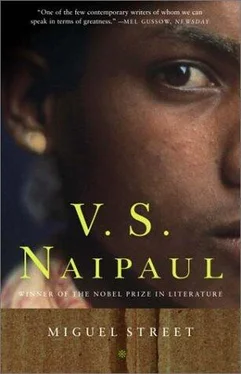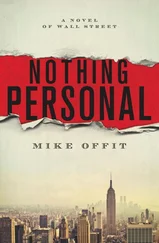The next day the people who had lent the money to buy the Bedford formed a deputation and came to Bhakcu’s house, begging him to desist.
Bhakcu remained under the lorry all the time, refusing to reply. The money-lenders grew angry, and some of the women among them began to cry. Even that failed to move Bhakcu, and in the end the deputation just had to go away.
When the deputation left, Bhakcu began to take it out of his wife. He beat her and he said, ‘Is you who want me to buy lorry. Is you. Is you. All you thinking about is money, money. Just like your mother.’
But the real reason for his temper was that he couldn’t put back the engine as he had found it. Two or three pieces remained outside and they puzzled him.
The agents sent a mechanic.
He looked at the lorry and asked Bhakcu, very calmly, ‘Why you buy a Bedford?’
Bhakcu said, ‘I like the Bedford.’
The mechanic shouted, ‘Why the arse you didn’t buy a Rolls-Royce? They does sell those with the engine sealed down.’
Then he went to work, saying sadly, ‘Is enough to make you want to cry. A nice, new new lorry like this.’
The starter never worked again. And Bhakcu always had to use the crank.
Hat said, ‘Is a blasted shame. Lorry looking new, smelling new, everything still shining, all sort of chalk-mark still on the chassis, and this man cranking it up like some old Ford pram.’
But Mrs Bhakcu boasted, ‘Fust crank, the engine does start.’
One morning — it was a Saturday, market day — Mrs Bhakcu came crying to my mother. She said, ‘He in hospital.’
My mother said, ‘Accident?’
Mrs Bhakcu said, ‘He was cranking up the lorry just outside the Market. Fust crank, the engine start. But it was in k’ear and it roll he up against another lorry.’
Bhakcu spent a week in hospital.
All the time he had the lorry, he hated his wife, and he beat her regularly with the cricket bat. But she was beating him too, with her tongue, and I think Bhakcu was really the loser in these quarrels.
It was hard to back the lorry into the yard and it was Mrs Bhakcu’s duty and joy to direct her husband.
One day she said, ‘All right, man, back back, turn a little to the right, all right, all clear. Oh God! No, no, no, man! Stop! You go knock the fence down.’
Bhakcu suddenly went mad. He reversed so fiercely he cracked the concrete fence. Then he shot forward again, ignoring Mrs Bhakcu’s screams, and reversed again, knocking down the fence altogether.
He was in a great temper, and while his wife remained outside crying he went to his little room, stripped to his pants, flung himself belly down on the bed, and began reading the Ramayana.
The lorry wasn’t making money. But to make any at all, Bhakcu had to have loaders. He got two of those big black Grenadian small-islanders who were just beginning to pour into Port of Spain. They called Bhakcu ‘Boss’ and Mrs Bhakcu ‘Madam,’ and this was nice. But when I looked at these men sprawling happily in the back of the lorry in their ragged dusty clothes and their squashed-up felt hats, I used to wonder whether they knew how much worry they caused, and how uncertain their own position was.
Mrs Bhakcu’s talk was now all about these two men.
She would tell my mother, mournfully, ‘Day after tomorrow we have to pay the loaders.’ Two days later she would say, as though the world had come to an end, ‘Today we pay the loaders.’ And in no time at all she would be coming around to my mother in distress again, saying, ‘Day after tomorrow we have to pay the loaders.’
Paying the loaders-for months I seemed to hear about nothing else. The words were well known in the street, and became an idiom.
Boyee would say to Errol on a Saturday, ‘Come, let we go to the one-thirty show at Roxy.’
And Errol would turn out his pockets and say, ‘I can’t go, man. I pay the loaders.’
Hat said, ‘It look as though Bhakcu buy the lorry just to pay the loaders.’
The lorry went in the end. And the loaders too. I don’t know what happened to them. Mrs Bhakcu had the lorry sold just at a time when lorries began making money. They bought a taxi. By now the competition was fierce and taxis were running eight miles for twelve cents, just enough to pay for oil and petrol.
Mrs Bhakcu told my mother, ‘The taxi ain’t making money.’
So she bought another taxi, and hired a man to drive it. She said, ‘Two better than one.’
Bhakcu was reading the Ramayana more and more.
And even that began to annoy the people in the street.
Hat said, ‘Hear the two of them now. She with that voice she got, and he singing that damn sing-song Hindu song.’
Picture then the following scene. Mrs Bhakcu, very short, very fat, standing at the pipe in her yard, and shrilling at her husband. He is in his pants, lying on his belly, dolefully intoning the Ramayana. Suddenly he springs up and snatches the cricket bat in the corner of the room. He runs outside and begins to beat Mrs Bhakcu with the bat.
The silence that follows lasts a few minutes.
And then only Bhakcu’s voice is heard, as he does a solo from the Ramayana.
But don’t think that Mrs Bhakcu lost any pride in her husband. Whenever you listened to the rows between Mrs Bhakcu and Mrs Morgan, you realised that Bhakcu was still his wife’s lord and master.
Mrs Morgan would say, ‘I hear your husband talking in his sleep last night, loud loud.’
‘He wasn’t talking,’ Mrs Bhakcu said, ‘he was singing.’
‘Singing? Hahahahaaah! You know something, Mrs Bhakcu?’
‘What, Mrs Morgan? ’
‘If your husband sing for his supper, both of all you starve like hell.’
‘He know a damn lot more than any of the ignorant man it have in this street, you hear. He could read and write, you know. English and Hindi. How you so ignorant you don’t know that the Ramayana is a holy book? If you coulda understand all the good thing he singing, you wouldn’t be talking all this nonsense you talking now, you hear.’
‘How your husband this morning, anyway? He fix any new cars lately?’
‘I not going to dirty my mouth arguing with you here, you hear. He know how to fix his car. Is a wonder nobody ain’t tell your husband where he can fix all his so-call fireworks.’
* * *
Mrs Bhakcu used to boast that Bhakcu read the Ramayana two or three times a month. ‘It have some parts he know by heart,’ she said.
But that was little consolation, for money wasn’t coming in. The man she had hired to drive the second taxi was playing the fool. She said, ‘He robbing me like hell. He say that the taxi making so little money I owe him now.’ She sacked the driver and sold the car.
She used all her financial flair. She began rearing hens. That failed because a lot of the hens were stolen, the rest attacked by street dogs, and Bhakcu hated the smell anyway. She began selling bananas and oranges, but she did that more for her own enjoyment than for the little money it brought in.
My mother said, ‘Why Bhakcu don’t go out and get a work?’
Mrs Bhakcu said, ‘But how you want that?’
My mother said, ‘I don’t want it. I was thinking about you.’
Mrs Bhakcu said, ‘You could see he working with all the rude and crude people it have here in Port of Spain?’
My mother said, ‘Well, he have to do something. People don’t pay to see a man crawling under a motor-car or singing Ramayana? ’
Mrs Bhakcu nodded and looked sad.
My mother said, ‘But what I saying at all? You sure Bhakcu know the Ramayana?’
‘I sure sure.’
Читать дальше












